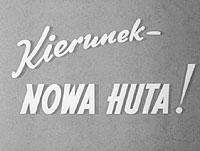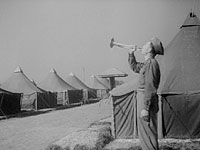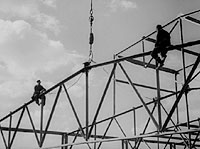 Kierunek – Nowa Huta!
Kierunek – Nowa Huta!
Poland, 1951, black and white, 12 mins
Watching Destination Nowa Huta! for the first time, I felt a strong sense of déjà vu, as this is undoubtedly the film that inspired Andrzej Wajda’s parody of an early 1950s Stalinist propaganda newsreel in his film Man of Marble (Człowiek z marmuru, 1977). That fake film’s poster-boy ‘hero’ Mateusz Birkut (played by Jerzy Radziwiłowicz), also worked in the Nowa Huta region of eastern Kraków, and the deconstruction of his carefully crafted public image by an idealistic young film student (Krystyna Janda) sets in train one of the most vivid examinations of the Stalinist period attempted when the Communists were still in power.

Notably unlike the early documentaries of Kazimierz Karabasz, Andrzej Munk’s film is unabashed propaganda for the Polish state’s cause, extolling the virtues of the giant construction project that sought to establish Nowa Huta as a major industrial centre. It was also deliberately populated by working-class workers who, the authorities believed, would act as a counterweight to middle-class protesters in Kraków who objected to Communist rule – though you won’t find even a hint of that in the film. Here, the stated reason for the Nowa Huta project is to prevent the peasants in a nearby village from either starving or having to travel abroad to seek work.
The film extols the work of various collective groups – one of them identified by Ewelina Nurczyńska-Fidelska’s notes in PWA’s DVD booklet as Służba Polsce (‘Service to Poland’), an organisation specifically designed to weaken the links between the younger generation of Poles (especially those from peasant backgrounds) and the Catholic Church that still had a huge influence on their elders, which they often carried out by active protest. Unsurprisingly, there’s no mention of this in the film: just a series of shots of fresh-faced young men exercising outside a row of tents in preparation for their contribution to building a glorious new socialist Poland. The narrator also singles out several individuals as being particularly inspiring in the Birkut mode – though their regional origin seems just as important a part of the collective-labour message.
After an attractive opening where the picturesqueness of the peasant village is at odds with the narration’s story of deprivation and hopelessness, the film’s aesthetic approach is squarely in line with the then dominant doctrine of Socialist Realism. The treatment of the workers is self-consciously ‘heroic’, with much use made of low camera angles to emphasise their muscled bodies against the skyline. The grim concrete blocks of flats in which the workers will live are “wonderful architectural visions” of “a city without basements or attic rooms” (is it reading too much into the narration to point out that basements and attics were traditionally where subversive activities take place?).

The narration (read by Andrzej Łapicki, perhaps best known in the west for playing the Wajda surrogate in his Everything For Sale/Wszystko na sprzedaż in 1968) is appropriately stentorian, leaving no cliché unturned (“Brighter days are no longer pie in the sky – each working day and each thrust of the shovel brings them closer!”). The film also emphasises how the output of Nowa Huta’s steelworks will supply the entire country – and, more tellingly, highlights the input of the USSR in terms of design, planning and logistics. At leisure, a worker is shown reading his favourite book – naturally, by a Soviet writer.
Given Andrzej Munk’s subsequent reputation, it’s tempting to try to read too much into the film, which was one of his first solo directorial credits after graduating from the Lodz Film School, and also represented a return to his native Kraków. In fact, he had been a member of the Polish United Workers’ Party (Polska Zjednoczona Partia Robotnicza, or PZPR) since 1948, though he would be expelled in 1952, the year after this film was made. Perhaps not coincidentally, his subsequent documentaries would show a greater tension between official demands and personal expression, though here he seems more concerned with delivering a polished piece of political propaganda. It’s impossible to deny its historical fascination, but its stature as a lasting work of art is much more suspect.
- Director: Andrzej Munk
- Script: Artur Międzyrzecki
- Camera: Jerzy Chluski, Romuald Kropat
- Music: Tadeusz Baird
- Editing: L. Protasiewicz
- Narrator: Andrzej Łapicki
- Production Manager: M. Ołtarzewski
- Production Company: Wytwórnia Filmów Dokumentalnych (Documentary Film Studio)
The film is included on PWA’s Polish School of the Documentary: Andrzej Munk double-DVD set (Region 0 PAL), and is in impressive condition for something nearly sixty years old that clearly wouldn’t have demanded the same standards of presentation as a historically important feature. There are some visual blemishes, but in general the print is in remarkably fine fettle, and if the sound’s a bit crackly, it’s easy to tune this out. The English subtitles, too, are clear, idiomatic, and correctly synchronised, and I spotted just one typo (there’s a reference to “hours pass interceptively”, though surely that should be “imperceptively”?). As for online commentary, Critical Culture has a wonderfully sarcastic demolition of the film, while this Culture.pl overview of Munk’s career mentions Destination Nowa Huta! in passing.
I saw this one recently, and couldn’t help but chuckle during the shot of a young Polish worker (no doubt steered by his “Soviet friends”!) reading — very clearly — a Polish translation of Azhayev’s Far from Moscow!